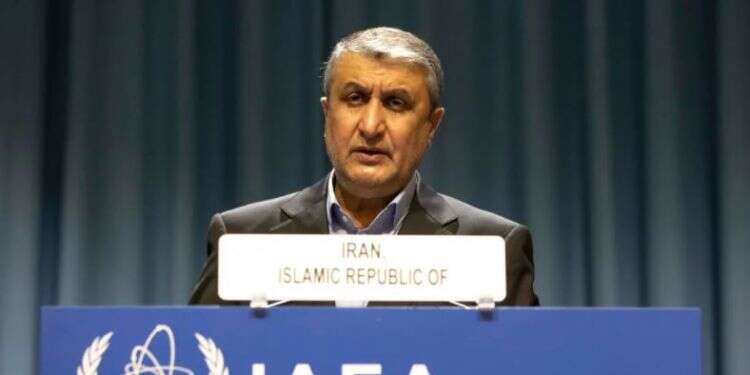Iran on Tuesday rejected calls by the United States and European Union to allow inspectors access to a nuclear site that was damaged in June in what Tehran claimed to be an act of sabotage by Israel.
Follow Israel Hayom on Facebook and Twitter
"Countries that did not condemn terrorist acts against Iran's nuclear site are not qualified to comment on inspections there," Mohammad Eslami, the head of Iran's Atomic Energy Organization, said while visiting Moscow.
The workshop at the TESA Karaj complex, located about 25 miles northwest of Tehran, was hit by apparent sabotage in June in which one of four International Atomic Energy Agency cameras there was destroyed.
Iran removed them and the destroyed camera's footage is missing.
The Vienna-based UN nuclear watchdog said that on Sunday inspectors were turned away from the facility. They were reportedly attempting to replace the destroyed cameras at the site but were denied access, which the IAEA said was in violation of a Sept. 12 agreement to allow inspectors to service the surveillance equipment.
"We are deeply troubled by Iran's refusal to provide the IAEA with the needed access to service its monitoring equipment, as was agreed in the Sept. 12 Joint Statement between the IAEA and Iran," a US statement to the IAEA's 35-nation Board of Governors on Monday said.
Iran disputed that the TESA Karaj complex was included in the deal.
Iran's ambassador to the IAEA Kazem Gharibabadi on Monday posted to Twitter that surveillance equipment related to the complex are "not included for servicing," adding that Sunday's IAEA statement "isn't accurate and goes beyond the agreed terms."
Also on Tuesday, France urged Iran to return to talks with world powers over its 2015 nuclear deal to avoid a diplomatic escalation that could jeopardize the negotiations.
Indirect talks between Iran and the United States on reviving the accord aimed at keeping Iran from being able to develop a nuclear weapon stopped in June before Ebrahim Raisi took office as Iranian president last month.
Western powers have urged Iran to return to negotiations and said time is running out as its nuclear program is advancing well beyond the limits set by the deal, which Washington abandoned in 2018.
"Nobody wants an escalation, but to avoid an escalation Iran must return to the negotiating table," a French official told reporters. "The more that time passes, the harder it becomes to return to the negotiating table ... and the key question of restoring a manageable and acceptable breakout time for us becomes complicated to resolve," he said, referring to the time it takes to amass enough fissile material for a single nuclear weapon.
The official said that world powers, including Russia and China, needed to remain united and that Beijing especially needed to "express itself and act in a more determined way".
Meanwhile, the United States has reached out to China diplomatically about reducing its purchases of Iranian crude oil, US and European officials said on Tuesday, as Washington seeks to persuade Tehran to resume talks about reviving the 2015 nuclear deal.
Purchases of Iranian oil by Chinese companies are believed to have helped keep Iran's economy afloat despite US sanctions that are designed to choke off such sales to put pressure on Iran to curb its nuclear program.
"We are aware of the purchases that Chinese companies are making of Iranian oil," said a senior US official.
"We have used our sanctions authorities to respond to Iranian sanctions evasion, including those doing business with China, and will continue to do so if necessary," he added.
Subscribe to Israel Hayom's daily newsletter and never miss our top stories!




